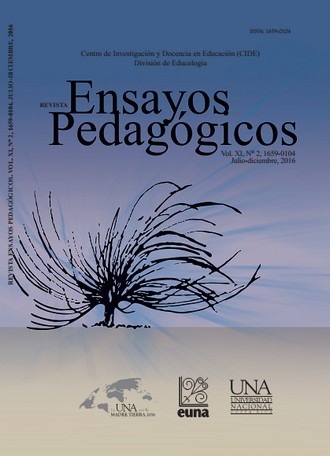Ubiquity and Mobility of Virtual Tools that Open New Formative Expectations for University Students
DOI:
https://doi.org/10.15359/rep.11-2.5Keywords:
higher education, online training, virtual learning environments, virtual learning, university, ubiquitous learningAbstract
Mobile learning is a field of research and educational practice that is rapidly expanding, so it is necessary to know its potential in education and learning. In this paper, we report on the results of a study with the objectives of knowing, identifying, and assessing applications, frequency, benefits, difficulties that mobile devices represent to enable ubiquitous and mobile learning of college students. Through questionnaires and protocols of life histories, an intercontinental sample with the participation of 875 students from eight countries was accessed. The main findings show that the laptop still is preferred for Internet access over the mobile phone, as well as for academic activities: preparation of work, study, search for information, exchange of notes and group work. However, the mobile phone is increasing its acceptance among students to achieve learning.
References
Asociación Mexicana de Internet. (2015). 11° estudio sobre los hábitos de los usuarios de internet en México 2015. Recuperado de https://amipci.org.mx/images/AMIPCI_HABITOS_DEL_INTERNAUTA_MEXICANO_2015.pdf el 26, 06, 2015
Centro de Estudios Especializados en Trastornos de Ansiedad. (2015). Hiperconectados: Adictos a la tecnología. Recuperado de http://www.ceeta.org/2015/06/14/hiperconectados-adictos-a-la-tecnología/ el 19, 09, 2015
Cope, B. y Kalantzis, M. (2009). Ubiquitous Learning. Exploring the anywhere/anytime possibilities for learning in the age of digital media. Estados Unidos: University of Illinois Press.
Diario ABC.es. (2015). La “nomofobia”, o el miedo a salir de casa sin el “Smartphone”, afecta ya al 75% de los españoles. ABC TECNOLOGÍA. Recuperado de http://www.abc.es/tecnologia/noticias/20150804/abci-adictos-smartphone-jovenes201508041542html el 25, 08, 2015
Quicios, M. P. (2015). Los dispositivos digitales móviles en educación superior: Usos y experiencias. En E. Vázquez-Cano, & M. L. Sevillano, (Edits.), Dispositivos digitales móviles en educación. El aprendizaje ubicuo. Madrid: Narcea.
Sevillano-García, M. L. (2014). Formación con información en la sociedad del conocimiento. En M. L. Sevillano García, Profanter Annemarie, M. C. Salgado Santamaría & E. Vázquez Cano, Espacio europeo de educación, inicial, media, superior y permanente. Madrid: Ediciones Académicas.
Sevillano-García, M. L. (2015). El contexto socioeducativo de la ubicuidad y la movilidad. En E. Vázquez-Cano, & M. L. Sevillano García (Edits), Dispositivos digitales móviles en educación. El aprendizaje ubicuo. Madrid: Narcea.
Tribuna. (13 de enero de 2012). Un modelo universitario para el siglo XXI. Diario El Mundo.
Trillo, M. P. (2015). Principios pedagógicos del aprendizaje ubicuo. En E. Vázquez-Cano, & M. L. Sevillano (Edits.), Dispositivos digitales móviles en educación. El aprendizaje ubicuo. Madrid: Narcea.
Vázquez-Cano, E. (2013). El videoartículo: Nuevo formato de divulgación en revistas científicas y su integración en MOOCs. Comunicar 41, 83- 91 DOI:http://dx.doi.org/10.3916/C41.2013.08
Vázquez-Cano, E, Sevillano García, M. L. & Méndez Pérez, M. A. (2011). Programar en primaria y secundaria. Madrid: Pearson.
Downloads
Published
How to Cite
Issue
Section
License
Ensayos Pedagógicos is subscribed to the Attribution-NonCommertial-NoDerivatives 4.0 International Creative Commons Licence, which allows both authors and readers to freely download, store, copy, and distribute the final approved publisehd version of the manuscript (post-print) as long as this is done without commercial purposes, no derivative works are generated, and the source and author are mentioned. As well, Ensayos Pedagógicos declares that authors will remain the rightful owners of the copyrights of their work in perpetuity.







